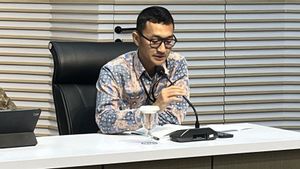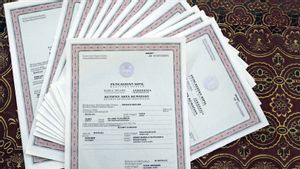JAKARTA - The Ewha Campus Complex (ECC) building, a landmark at Ewha Womans University, is famous for its architecture designed by French architect Dominique Perrault. The unique structure, which connects the underground and ground floors, made up of large glass windows on both sides of the central passageway, has become an iconic landmark.
However, this structure creates problems that have often occurred in recent years. A number of birds, including endangered ones, are often found dead near the ECC because they don't recognize windows as obstructions, fly and crash into them.
"When birds collide with windows like this, the main reason is the transparency of the window and the reflection of objects in it," Kim Yun-jeon, group leader of the Window Strike Monitoring group at Ewha Womans University told The Korea Times as quoted Sept. 7.
The group of five has carried out daily surveillance of dead and injured birds on the university campus since 2019.
"Most of the birds that flew into the windows died from skull fractures, or brain haemorrhages from the impact caused by their high speed," Kim explained.
The team has been investigating how often such collisions occur. After receiving reports of bird collisions, mostly from school cleaners, security guards and students, the team confirmed and recorded them every day.
According to the team's data, a total of 161 birds had collided with the windows of university buildings in South Korea from May 30, 2019 to August 31 this year, of which 106 or 65.8 percent were windows of the ECC building.
Among the birds that died were vinous throated parrotbills, Japanese tits, black-faced buntings to the northern boobook designated as South Korea's No. 324 Natural Monument.

"At the top of the building, shrubs are planted and reflected in the glass windows, so we suspect many birds may not see it as an obstacle that they must avoid," said Kim.
The problem of birds hitting the ECC building is not new. Kim's team continued to raise the issue with the university's management office, but little progress was made.
In March, based on relevant data and statistics collected over about 17 months, the team sent a request letter to the university management office to take preventive measures, such as sticking special stickers on windows, which are known to reduce bird strikes.
However, in April, management said in a written response, it was difficult to undertake such an action without consensus among students and faculty members, as it was a matter of changing the appearance of the building, as well as involving cost issues.
As the migration season approaches, the number of birds colliding with windows is expected to increase, according to Kim. Meanwhile, environmental groups say sticking stickers on glass windows can go a long way in preventing birds from flying into them.
According to data released by the Ministry of Environment and the National Institute of Ecology in 2019, 38 cases of collisions occurred around glass soundproof walls in Daejeon for 113 days starting from February 3, 2018. However, not a single case was found in Daejeon. around the same wall for 113 days starting December 23, 2018, after the sticker was installed.
However, considering durability and construction costs, the best measure is to design the building in a way that prevents birds from hitting windows, or to use patterned glass in the building's design, Kim said.
The English, Chinese, Japanese, Arabic, and French versions are automatically generated by the AI. So there may still be inaccuracies in translating, please always see Indonesian as our main language. (system supported by DigitalSiber.id)













